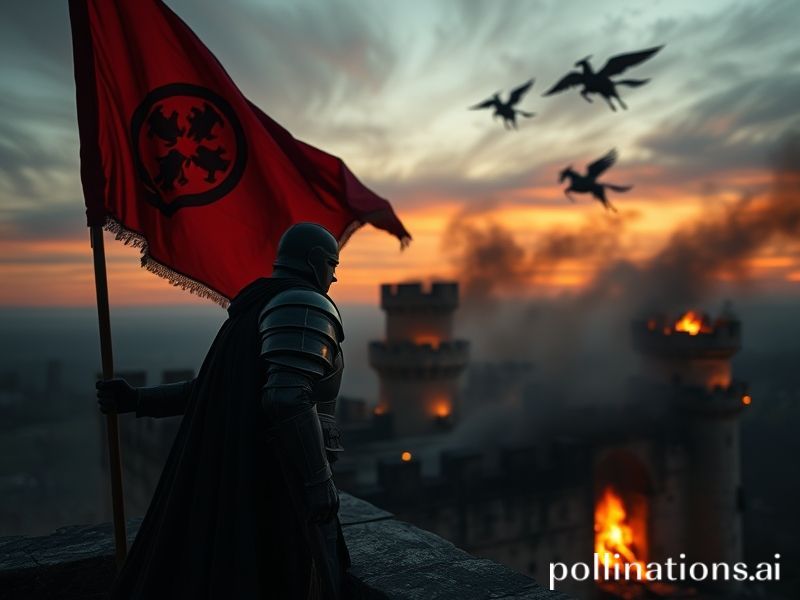Fire Emblem: How a Japanese RPG Became the World’s Accidental War College
Fire Emblem: The Geopolitical Classroom Nobody Asked For
By Our Correspondent Who Has Watched Too Many UN Security Council Re-runs
Geneva—While diplomats in this city exhaust themselves arguing over comma placement in sanctions resolutions, a quieter form of international conflict mediation unfolds on 3-inch OLED screens from Manila to Montevideo. Nintendo’s Fire Emblem—once a Japan-only curiosity—has become the de-facto war college for a generation that will probably never be invited to the actual Geneva Conventions. The tactical-roleplaying franchise, currently celebrating its 33rd birthday and its 17th or so identity crisis, now ships in eight languages and counting, proving that nothing unites humanity quite like the urge to watch pixelated royals make spectacularly bad alliance decisions.
The games’ central mechanic—permadeath—has always been a cheeky wink at real-world mortality. Lose a soldier in Fire Emblem and they stay dead, unlike in global affairs where the same discredited strongmen respawn on Sunday talk shows. This digital Darwinism has unexpected pedagogical value: UN field officers from Nigeria to Nepal report that rookies who grew up shepherding anime swordsmen across grid maps grasp supply-line fragility faster than peers whose tactical education began and ended with Call of Duty kill-streaks. One NGO security advisor confessed he diagrams Fire Emblem chokepoints when briefing peacekeepers on South Sudanese river crossings—“because the UN budget won’t stretch to actual sand-table exercises anymore.”
Nintendo’s writers, presumably fueled by expired instant ramen and existential dread, have spent decades remixing history’s greatest hits: succession crises, resource wars, weaponized religion, immigration panic, and that evergreen classic, the surprise empire built on dragon bloodlines. The newest entry, Fire Emblem Engage, drops a neon-colored protagonist into a continent that looks like Crimea cosplaying Candy Crush. It sold three million copies in six weeks—numbers that would make most NATO communiqués weep with envy. Analysts at Stockholm International Peace Research Institute (yes, they downloaded it; no, they won’t admit on which government laptop) note the franchise’s soft-power punch: Japan exports fewer tanks these days, but its cultural arm exports strategic thought experiments dressed in j-pop haircuts.
The fandom itself is a miniature UN General Assembly, minus the filibustering and with significantly more body pillows. Reddit diplomacy threads dissect whether the Kingdom of Brodia’s trade tariffs mirror Trump-era steel quotas; Brazilian fan-artists redraw characters in Portuguese colonial garb; Korean speed-runners calculate optimal turn counts the way Pentagon interns once bean-counted Soviet tank production. The community’s unofficial motto—“Waifus over warfare”—sounds adorable until you realize it’s disturbingly close to the foreign-policy priorities of several actual heads of state.
Of course, translating medieval fantasy into contemporary geopolitics has its hiccups. The series insists that deep-seated ethnic hatreds can be solved by holding hands during a support conversation, a mechanic that the Balkans stubbornly refuses to patch. Meanwhile, permadeath’s ruthless calculus—sacrifice the archer to save the healer—mirrors the cold utilitarianism of drone strike dossiers, minus the congressional hearings. One Brussels think-tank tried to gamify refugee flow management using Fire Emblem AI; the algorithm kept marrying Syrian medics to Scandinavian princes and was quietly shelved.
Still, the games offer something most international summits no longer deliver: closure. Campaigns end, credits roll, fallen units stay buried. Contrast that with the real-world’s endless DLC—frozen conflicts that reboot every console generation, arms deals that respawn like DLC loot boxes. Perhaps that’s why Fire Emblem’s audience now spans conscripts in Kyiv, cadets in Lagos, and salarymen on the Tokyo Yamanote line: we’re all looking for a battlefield where choices matter and someone, somewhere, actually learns from the last war.
When the next actual ceasefire collapses—check your push notifications for the current candidate—diplomats will dust off the same press-release Mad Libs: “deep concern,” “all parties,” “immediate de-escalation.” Gamers, meanwhile, will simply restart the chapter, shuffle their roster, and try not to repeat yesterday’s tactical blunder. One can’t help but admire the efficiency: in a world addicted to reruns of its own failures, at least the kids are speed-running theirs.







